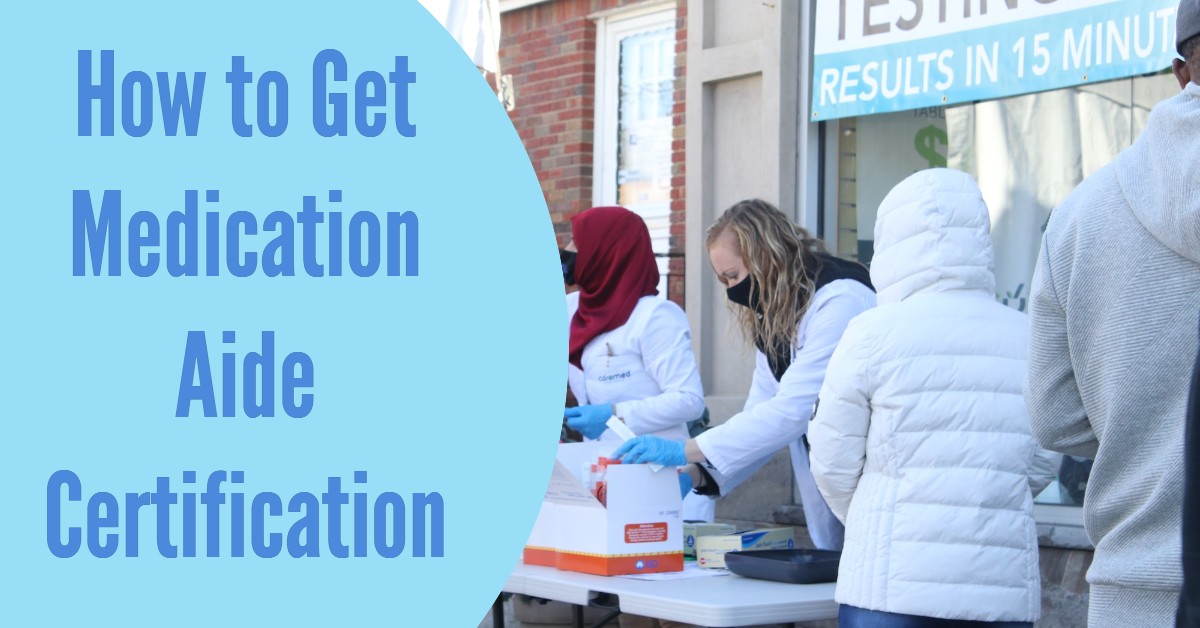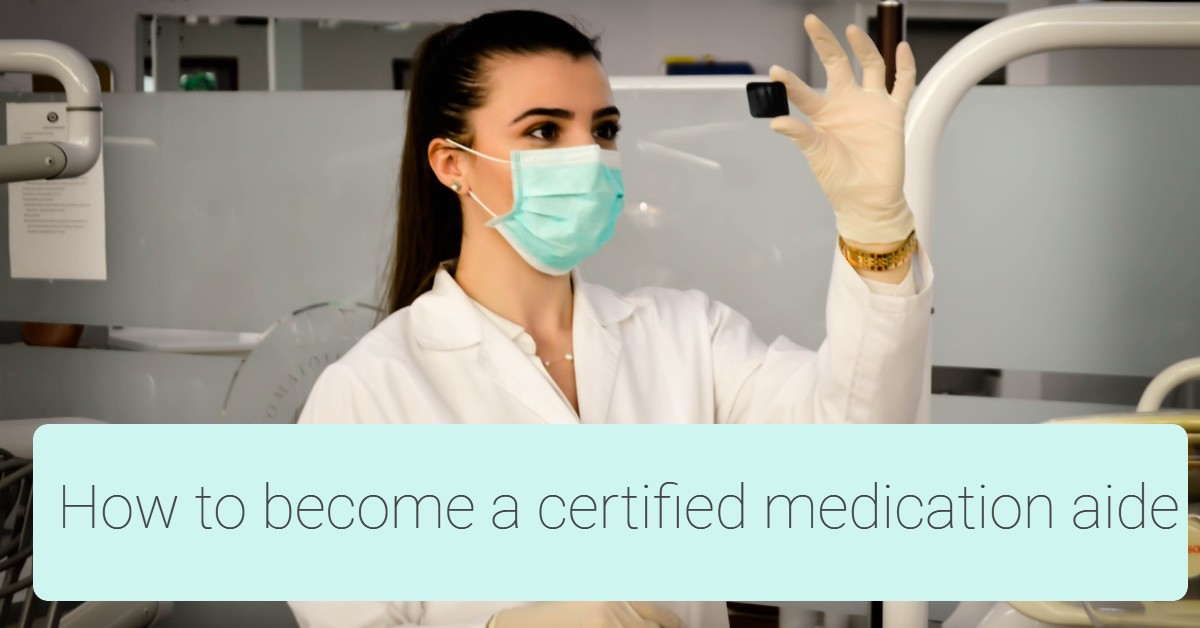How to Get Medication Aide Certification (2025 Guide)
Hello there! Let’s examine how to get medication aide certification.

A certified medication aide administers medications to patients in healthcare facilities. They also work as a certified nursing assistant (CNAs) and help with patient care. Knowing how to become a certified medication aide and the job requirements can help you decide whether it is the right career for you.
Before we carefully analyze the steps required to become a certified medication aide, let us clearly understand the responsibilities and job description of a medical aide.
Who is a medication aide?
A certified medication aide is a type of certified nursing assistant who has been trained to give medication to patients in hospitals and other healthcare settings.
Therefore, a certified medication aide can also help with patient care as a nursing assistant.
Medication aide is an entry-level position that can lead to a long-term career in the healthcare industry.
A certified medication aide administers medications to residents in:
- Nursing facilities
- Intermediate care facilities for individuals with an intellectual disability or related conditions
- Correctional institutions
- Assisted living (personal care) facilities
Simply put, a certified medication aide is a medical professional who has the authority to dispense medications to patients in a variety of healthcare settings. Medication aides work in hospitals, nursing homes, correctional facilities, and intermediate care facilities.
On the job, the medication aide may be supervised by a registered nurse (RN). They give medication to patients on a daily basis and keep track of dosing and drug use.
The following are the essential responsibilities of a certified medication aide:
- Keep track of the amount of medication taken, and the time it was taken.
- Collect samples for laboratory testing.
- Gives patients both non-prescription and prescription medications.
- Work with the nursing staff to manage patient medication and care.
- Ensure that the dispensary has adequate drug supplies.
- Advise and educate patients to ensure they follow medication usage instructions.
- Inform supervisors of any negative changes in patients caused by medication.
- Ensure the safety of patients and staff, and adhere to all health regulations.
How to Get Medication Aide Certification

To get a medication aide certification, you must successfully complete the medication aide training program, which includes:
- 100 hours of classroom instruction and training
- 20 hours of returned skills demonstration laboratory
- 10 hours of clinical experience, including clinical observation and skills demonstration under the direct supervision of a licensed nurse in a facility, and 10 hours in a return skills demonstration laboratory.
- You also must take the medication aide examination, which consists of 100 multiple-choice questions that cover your knowledge of accurate and safe drug therapy.
Applicants who fail the exam may retake it once; the second test is free of charge. A written request to retake the test must be submitted to HHS, and the second exam must be completed within 45 days of the failure notification.
If you fail the second exam, you can take it again only if you enroll in and complete another training program.
Requirements to be a medication aide
A certified medication aide (CMA) is a professional who has CNA qualifications as well as an additional certificate that allows them to dispense medication to patients.
Certified medication aides work under the supervision of a Registered Nurse (RN) and assist health care staff with patient medication and dosing.
A medication aide tracks prescription and non-prescription drugs that they administer to patients. A CMA’s primary responsibilities include accurately documenting dosage times and amounts, as well as ensuring that patients swallow their medication.
When you are not working as a medication aide, you will be a CNA and will continue to care for patients.
To be a medication aide in a licensed facility, you must:
- Read, write, speak and understand English
- Be at least 18 years old
- Be free of communicable diseases and in suitable physical and emotional health to safely administer medications
- Have graduated from high school or have a GED
Must Read: 2025 Caregiver Jobs in the US With Visa Sponsorship – Apply Now Easily!
Can a nursing student or graduate take the medication aide examination without completing the 140-hour course?
Yes, a nursing student or graduate can take the medication aide examination without completing the 140-hour course under certain circumstances.
People who are attending or have attended an accredited school of nursing and who aren’t licensed to practice professional or vocational nursing meet the training requirement if they:
- Attended the nursing school no earlier than January 1 of the year immediately preceding the year of application for a permit
- Successfully completed courses at the nursing school that cover the HHS curriculum for a medication aide training program
- The nursing school’s administrator or other authorized individual certifies in writing that the courses have been completed. The administrator is responsible for determining that the courses cover the HHS curriculum.
- Graduates of accredited schools of nursing who aren’t licensed to practice professional or vocational nursing meet the training requirement for a permit if their date of graduation from nursing school was no earlier than January 1 of the year immediately preceding the year of application for a permit.
Costs of Receiving a Medication Aide Permit
The fee schedule is as follows:
- First Renewal Fee — $15, no CE hours required
- Late Renewal (less than 90 Days) — $22.50
- Late Renewal (91-365 Days) — $30
- Late Renewal (more than one year) — Must retrain and retest
- Second Renewal and thereafter — $15 after seven CE hours completed
- Late Renewal (less than 90 Days) — $22.50
- Late Renewal (91-365 Days) — $30
- Late Renewal (more than 1 year) — Must retrain and retest
Note: The permit must be renewed once a year in accordance with the Licensing Standards for Medication Aides.
How to become a certified medication aide

To apply to be a certified medication aide, candidates must be at least 18 years old. The following are the steps to becoming a certified medication aide:
1. Finish your education
Medication aides, unlike other healthcare professions, do not need a bachelor’s degree to be certified. However, in order to obtain certification, a basic education (such as a high school diploma or a GED) is still required.
2. Get your CNA certification.
A medication aide is a certified nursing assistant (CNA) who is also trained in medication administration. Before applying to a medication aide training program, candidates must first obtain a CNA certification.
CNA programs are common in community colleges and medical education institutions, and they typically last 6-12 weeks.
A CNA program will teach you how to communicate effectively and how to care for patients.
3. Obtain your CMA certification.
The certified medication aide (CMA) certification process takes about four months. As part of the requirements, candidates must demonstrate at least 140 hours of clinical practice during their training period.
Most states require CMA candidates to pass an examination in order to obtain their Certified Medication Aide (CMA) license. They will be able to administer medication in any facility once they have received this license.
It is critical to find a good medication aide training program that will prepare you for the certification exam.
The proposed curriculum should include the following topics:
- Medication: Types, interactions and side effects
- Legal, ethical and regulatory considerations related to the administration of medication to patients
- Safe administration and control of medication
- Record-keeping and communication in the healthcare team
You should be aware that the specifics of your certification training program, such as the required number of hours of clinical practice, may differ depending on where you live.
4. Acquire industry experience
The majority of CMA training programs include extensive hands-on experience. Take advantage of any opportunity to gain industry experience during your training.
Employers may require at least one year of relevant industry experience. They will know you have demonstrated your ability and skills to handle the tasks associated with the medication aide role. During this time, you should try to learn skills that will help you succeed in the industry.
You should also learn medical and pharmacological terminology.
5. Apply for positions as a medication aide.
After you have obtained the necessary qualifications and skills, you should apply for a job. Hospitals, care homes, long-term care facilities, rehabilitation centers, correctional facilities, assisted living care centers, and medical research facilities accept applications.
Customize your resume for each job application to increase your chances of success. Key skills to emphasize include knowledge of patient care procedures, attention to detail, and the ability to manage adverse drug reactions in patients.
6. Make a commitment to continuous education.
Even after you get certified and get a job, you should keep learning. Continuous learning improves your skills and keeps you ahead of the competition.
Legislation governing medication administration and management, for example, may change. Keeping up with such developments will ensure that you stay within the bounds of the law.
It is critical to remember that your medication aide certification is not permanent; you must renew it at regular intervals by taking a new exam. If you fail any of these exams or tests, your certification may be revoked by the state medical board.
There are numerous opportunities to further your education as a medication aide. Refresher courses and online classes are resources that can help you improve your CMA skills.
Essential Skills for Certified Medication Aides
What skills do certified medication aides require? To become an excellent medication aide, you must first understand the necessary skills required. Employers look for the following qualities in prospective medication aides:
1. Detail-oriented
Medication aides must be observant and capable of noticing minute details. They must record prescription dosages and times of use and ensure that the information is correct.
2. Organization
Medication aides must ensure that drugs are administered to patients on a regular basis. They must record who used what drug, in what quantity and by what time. Aside from supervising drug administration, they must monitor patient behavior on a daily basis.
3. Computer skills
Employers expect medication aides to be technologically savvy because they must use computers to complete their tasks. Depending on your employer, you may be required to update patients’ medical records using specialized medical software.
4. Caregiving
Aside from dispensing medications, the medication aide assists nurses in patient care. This is common, especially among certified medical assistants who work in nursing homes and other similar facilities. You must understand the fundamentals of patient care. This could include learning how to care for people with intellectual disabilities, as well as bathing and monitoring patients.
5. Behavior analysis
The medication aide must observe patient behavior after administering drugs in order to evaluate the effects of the medication. This is critical for detecting adverse drug effects in patients.
Employers prefer medication aides who are trained in behavior analysis. Such individuals are better positioned to assess the efficacy of medications as well as their potential side effects on patients.
6. Administration of medication
Medication administration is the primary responsibility of any medication aide, so employers prefer individuals with extensive experience in this area. Understanding major drug types, including their actions, side effects, and indications, is part of this skill. It is also necessary to understand how to prescribe and track medication dosage.
Certified Medication Aide Job Description Sample
You can get a good idea of what employers are looking for when hiring for this position by reviewing this Certified Medication Aide job description sample. Remember that each employer is unique, and each will require different qualifications when hiring for a Certified Medication Aide position.
Job Summary
Our assisted living facility is looking for a Certified Medication Aide (CMA) to dispense medication to patients carefully. In this position, you will work under the supervision of an RN and assist staff members as needed. You are responsible for making sure patients take the right medications at the right time. Our ideal candidate has experience in elderly care, long-term care, or memory care at a nursing home, assisted living facility, or hospital. We are seeking someone who can provide the highest standard of care for our residents and patients.
Duties and Responsibilities
- Dispense patient medications
- Track all prescription and non-prescription drugs that you administer, keeping meticulous records of dosage times and amounts
- Ensure patients take their medication
- Follow all facility standards and regulations to ensure the safety of patients and staff
Requirements and Qualifications
-
Current Medication Aide certification
-
At least one year of experience, ideally in an assisted living, memory care, or elderly care setting
-
BLS certification
-
Passion for caring for others
-
Interpersonal skills
-
Keen attention to detail
Average Salary of a Certified Medication Aide
Several factors can influence the salary of certified medication aides. These elements include the employer, the location, the qualifications, the experience, and the specific job duties and responsibilities.
Data shows that certified medication aide professionals in the United States earn $45,299 per year. According to the US Bureau of Labor Statistics, nursing assistants and orderlies earn $30,290 per year. Nursing assistants and orderlies both perform similar duties to medication aides. As a result, we assume that the salary for medication aides will be around that amount.
Conclusion:
Now you know all about medication aides and how to get medication aide certification. You may want to contact us via the comment section below if you have any questions. And don’t forget to share this article with others. Thank you.
Recommended:
Read the following related articles.
6-Month LPN Programs (Schools & Certification)
Highest Paying States for Nurse Practitioners (NPs): 2025 Review
4-week medical assistant programs